Bethesda, MD - A multicenter study designed to compare the efficacy of an individualized reiki session to cardiac defibrillation in patients with ventricular fibrillation has been stopped after the death of several participants.
 |
| Study subject #7, shown here failing to respond to an individualized reiki treatment for ventricular fibrillation, probably because of his bad attitude |
"We are all pretty upset about what happened," Pam Fender, a Level 7 Cardiac Reiki Master (CRM) and lead investigator at the National Center for Complementary and Integrative Health (NCCIH), explained. "Honestly, if we had known ahead of time that manipulating human energy fields would fail to restore a perfusing cardiac rhythm, we wouldn't have done the study."
Reiki, an ancient technique that involves the channeling of healing energy through touch from practitioner to patient in order to activate innate restorative processes, can have powerful subjective effects. According to Fender, however, it does have limitations. "Reiki energy comes from an infinite source, but it is only as effective as the person doing it. It's not magic. It takes training."
Previous reiki studies funded by NCCIH had found that group reiki, sometimes called a "reiki share", is not helpful in the management of life-threatening heart rhythm abnormalities either as the primary treatment or as a complement to Western defibrillation. Fender, who recently achieved Level 7 by grinding experience points treating middle-aged women with fatigue, had been confident that individualized treatment would be proven efficacious in a clinical trial. "In the group setting, there isn't time to individually assess imbalances. Sure it's nice to have a casual atmosphere of friendship, honor, positive energy, and devotion, but a one-on-one relationship both expedites and magnifies a therapeutic alliance."
Despite the optimism of the research teams involved in the study, the complete lack of any benefit in patients in ventricular fibrillation, a dangerously rapid and irregular heartbeat that doesn't provide effective circulation of blood around the body, was apparent from the very beginning. According to NCCIH Director Helene Langevin, this is just how science works. "This is why you do the studies. Every dead end, no pun intended, is an opportunity to learn more. Maybe reiki just doesn't restore a healthy perfusing rhythm, or maybe these subjects weren't open to the process because of a lack of motivation and focus."




